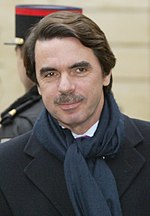José María Aznar, Date of Birth, Place of Birth
TweetJosé María Aznar
Spanish President from 1996 to 2004About José María Aznar
- José María Alfredo Aznar López (Spanish pronunciation: [xo'se ma'?i.a al'f?eðo a?'na? 'lope?] (listen); born 25 February 1953) is a Spanish politician who served as the Prime Minister of Spain from 1996 to 2004.
- He led the People's Party (PP), the dominant right-of-centre party in the country at the time. A member of the Frente de Estudiantes Sindicalistas, a student organization in which a 16-years-old Aznar espoused an independent brand of Falangism, he obtained a law degree from the Complutense University of Madrid and his first job was in the public sector, specifically, as an Inspector of the Finances of the State (Spanish: Inspector de las Finanzas del Estado).
- He joined the Popular Alliance, which was re-founded as the People's Party in 1989.
- He led the Junta of Castile and León from 1987 to 1989 and was Leader of the Opposition at the national level from 1989 to 1996.
- In 1995, he survived an assassination attempt from the Basque separatist group ETA. The People's Party, led by Aznar, won the most parliamentary seats at the 1996 general election, but he failed to obtain a majority in the Congress of Deputies, which forced the PP to seek the support of Basque (EAJ-PNV), Catalan (CiU) and Canarian (CC) regionalists.
- He was finally invested Prime Minister on 4 May 1996, and his first term was marked by the market liberalization, deregulation of the economy, cut state expenses and privatized several state-owned companies.
- During his first term, the economy grew and Spain met the criteria to participate in the creation of the eurozone, but unemployment remained moderately high.
- Some relevant events in Aznar's first term were the assassination of PP politician Miguel Ángel Blanco by ETA.
- Aznar attempted to negotiate with ETA between 1998 and 1999, but the parties did not reach an agreement and violence continued. Aznar also got the most votes in the 2000 general election this time obtaining an absolute majority of 183 deputies (out of 350) in the Congress.
- The economy kept growing and unemployment finally began to fall during his second term.
- In foreign policy, Spain adopted a neoconservative approach and grew closer ties with the United States and the Bush administration, in the aftermath of the September 11 attacks.
- Aznar supported the invasions of Afghanistan and Iraq.
- In 2002, he faced harsh criticisms for the actuation of the government during the Prestige oil spill in Galicia.
- Support of the PP further declined after the invasion of the Iraq, which was not supported by the majority of the Spanish population, but was nevertheless carried out with Spanish support for the U.S.
- and the UK.
- A 2003 poll found by the public research institute CIS found that 91% of Spaniards were against the invasion of Iraq.In 2004, a general election in Spain was scheduled for 14 March, which was not contested by Aznar, but by his successor as lead of the PP, Mariano Rajoy.
- On 11 March, the 2004 Madrid train bombings occurred, which killed 192 people.
- The attacks were perpetrated by al-Qaeda, but the government claimed the bombings were perpetrated by ETA.
- In the few days between the bombings and the election, the PP defended this position: however, a major sector of the population rejected the hypothesis that the attacks were perpetrated by ETA and believed the government was lying because of the bombings' possible connection to Spanish support for the invasion of Iraq.
- This led to a massive drop in support for the PP in the days before the election, and the opposing PSOE's José Luis Rodríguez Zapatero won the election. Aznar remains active in the private sector, and he sometimes gives his views on the politics of Spain.
- He was also a member of the Council of State from 2005 to 2006.
- He is the president of Spanish think tank FAES and is a director of News Corporation.
- He held the honorary (symbolic) presidency of the PP until 2016, when he renounced to the title.
Read more at Wikipedia


 Date of Birth:
Date of Birth:  Place of Birth: Madrid, Community of Madrid, Spain
Place of Birth: Madrid, Community of Madrid, Spain